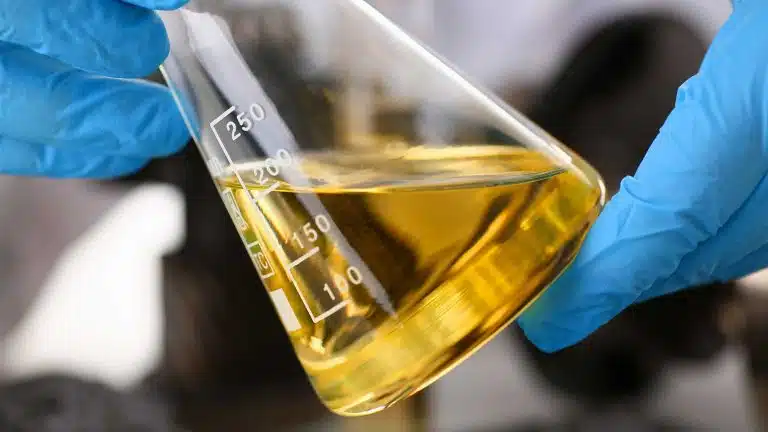Synthetic Alcohol | What Is ‘Hangover-Free’ Synthetic Alcohol?

The dangers of alcohol consumption are well-known. Most people know the harm it can do to your body and what occurs the next morning after heavy drinking.
But what if there was something that gave the same feeling as alcohol but without the dangerous side effects and the possibility of a hangover the next day? Synthetic alcohol might be the answer.
What Is Synthetic Alcohol?
The most well-known form of synthetic alcohol was originally known as Alcosynth but has been rebranded as Alcarelle.
It’s a synthetic alcohol substitute that was first developed by a UK Professor and scientist David Nutt, the director of the neuropsychopharmacology unit at Imperial College London, and his business partner, David Orren. They recently rebranded their company in 2021 to GABA Labs.
Professor Nutt’s goal was to produce a safe and responsible alternative to alcohol that could provide both a relaxing effect and be a social lubricant. But he also wanted it to not produce the negative effects of alcohol like hangovers or liver damage.
How Synthetic Alcohol Was Produced
According to Nutt, he came up with synthetic alcohol after discovering an antidote for alcohol in 1983 when he was a Ph.D. student. Unfortunately, the antidote was too dangerous to be given out readily as it caused seizures. But that discovery led him to research more.
The original idea for Alcarelle came when he was studying the effects of alcohol on the GABA receptors in the brain. Gamma-aminobutyric acid (GABA) is a neurotransmitter that blocks signals between different nerve cells and is most associated with feeling relaxed and sedated.
With Alcarelle, Nutt claims it can identify the specific GABA receptors in the brain that induce tipsiness while avoiding receptors that result in adverse side effects such as headaches or dizziness.
The exact composition of Alcarelle isn’t known, but it seems to be in production and waiting for further testing.
How Synthetic Alcohol Works
To produce its well-known effects, alcohol binds to the GABA receptors and makes the person drinking feel relaxed or sleepy.
Nutt tried to recreate that bond with GABA but without the downsides that come with alcohol like hangovers and withdrawal symptoms. Not to mention addiction. According to Nutt and Orren, they have achieved this.
Synthetic alcohol will also likely allow modifications. This means you can choose whether you want to feel the effects of drinking it or not. But either way, you won’t be able to actually get drunk off of it.
If what Professor Nutt and David Orren are touting is true, this could change a lot of people’s lives and possibly decrease the deaths and injuries due to alcohol.
Is Synthetic Alcohol Safer Than Normal Alcohol?
One of the main reasons Alcarelle is considered safer than standard alcohol is because less of it needs to be ingested in order to feel the effects. And, only the positive effects are produced.
Alcarelle is also broken down in the body differently than regular alcohol. Alcarelle does not break down into a compound called acetaldehyde.
When ethanol (alcohol) is broken down in the body, it produces acetaldehyde which is considered a toxin.
If someone drinks heavily, the toxin can build up faster than it can be metabolized and cause damage to the body. This damage can lead to things like cirrhosis, liver disease, and heart disease.
Health Effects Of Synthetic Alcohol
While Alcarelle may be safer than normal alcohol, how safe it is and what effects it has on our health is not yet known.
Only a few of the people working on this hangover-free alcohol have tried it so no one outside that group can say whether it’s safe or what it tastes like. Although, it has been said it doesn’t taste great and will need to be mixed with fruit juice or other mixers to be palatable.
Is Synthetic Alcohol Available?
Nutt’s team does plan to work along with food scientists to test Alcarelle’s safety and their end goal is to have it regulated as either a safe food additive or an ingredient within the next five years.
Before you try any form of synthetic alcohol or alcohol alternative, be sure you research it and see if it’s gone through rigorous safety testing. If it hasn’t been tested by multiple agencies, it’s difficult to know what effect it could have on your health.
Written by Ark Behavioral Health Editorial Team
©2024 Ark National Holdings, LLC. | All Rights Reserved.
This page does not provide medical advice.
GABA Labs - FAQs
Journal of Psychiatry and Neuroscience - The role of GABA receptors in mediating the effects of alcohol in the central nervous system
The Guardian - Could ‘alcosynth’ provide all the joy of booze – without the dangers?
The Scripps Research Institute - The Effects of Alcohol on the Brain
Questions About Treatment?
Ark Behavioral Health offers 100% confidential substance abuse assessment and treatment placement tailored to your individual needs. Achieve long-term recovery.
100% confidential. We respect your privacy.
Prefer Texting?
Our friendly support team is here to chat 24/7. Opt out any time.







 Learn More
Learn More








